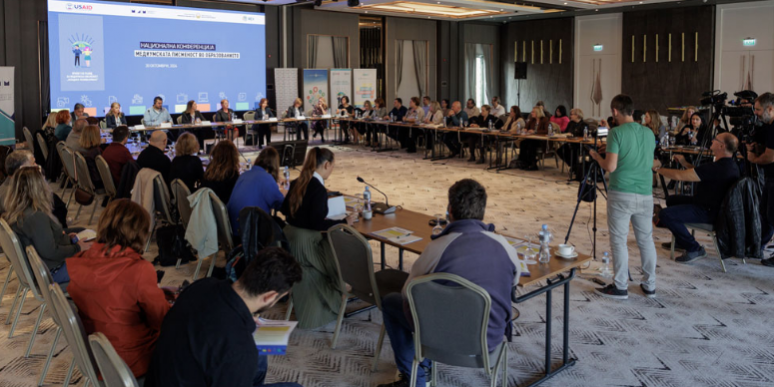How the implementation of media literacy into the primary education curricula is going and what activities shall be carried out in secondary education were some of the topics of the Conference on “Media Literacy in Education,” organized by the Macedonian Media Institute (MIM) and IREX as part of the USAID’s “YouThink” media literacy project.
MIM and IREX have been cooperating with the educational institutions for the past three years in the process of including media literacy in formal education. As a result, in 2021, media literacy became part of the 1st to 8th grades’ curricula, and more than 8,000 teachers of all schools around the country were trained on how to organize classes on this subject in their curricula. 
Minister of Education and Science Vesna Janevska spoke at the Conference and pointed out that “media literacy education enables students to make decisions and judgments based on facts independently”. “Students acquire skills to critically analyze content they receive from various sources, understand it within the given context, connect it with other information and be able to assess its quality,” she underlined. In her view, it is important to encourage activities for further improvement of the educational system in the field of media literacy.
USAID Country Representative Jeri Dible dwelled on disinformation as a threat that may undermine trust in the institutions and democratic values. “Young people who are media literate have the potential to be more engaged, empathetic and responsible citizens. Let us continue to support the development of these important skills and help young people make a positive impact on their communities and the future of the state,” said Ms Dible.
The Bureau for Development of Education (BRO), DIC and MIM representatives presented the activities carried out in primary education so far. Ajshe Ajrullai of BRO indicated that, at the media literacy classes, students develop critical thinking, communication and digital skills and learn how to use media content responsibly. She emphasized that it was necessary to continuously strengthen teachers’ knowledge and skills, as well as prepare resources for the implementation of these classes. MIM representative Vesna Nikodinoska added that media literacy handbooks for teachers were being prepared, which should help them organize the classes efficiently. She informed that, with the support of the Project, 80 media clubs had been established, where students can learn about journalism and create media products.
Beti Lameva of the State Examination Center presented the findings of the state tests of 3rd– and 5th-graders, which indicate that the students should learn to differentiate, understand and assess media content, as well as to create media messages. “We need to encourage students to think critically, solve problems and apply knowledge in real situations,” added Lameva.
The results of the media literacy research among high school, 1st– and 2nd-year, students were presented by the Director of the Agency for Audio and Audiovisual Media

Services, Zoran Trajchevski. According to the findings, students had been using a moderate level of critical thinking, where many had been able to identify disinformation but had lacked the skills to verify the source of the online content; had been proficient in using digital devices but had had a limited understanding of data privacy and security. “There is a need for a more thorough integration of media literacy into the educational system, with the focus being placed on practical skills and critical thinking, teacher training, as well as conducting awareness-raising campaigns,” Trajchevski pointed out.
Dejan Dokuzovski, Director of the “YouThink” project, spoke about the next steps regarding the inclusion of media literacy in secondary education. He stressed that, with this, media literacy would be included in all levels of formal education, taking into account that eight faculties had already been developing modules or electives in this field through the activities implemented by IREX and the Institute of Communication Studies.
 This Conference was part of UNESCO’s global event, the Media and Information Literacy Week, this year organized under the motto “Media and Information Literacy for Public-Interest Information”.
This Conference was part of UNESCO’s global event, the Media and Information Literacy Week, this year organized under the motto “Media and Information Literacy for Public-Interest Information”.






